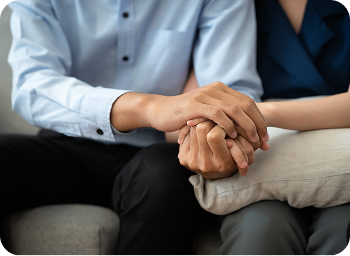
Q&A with Geoff: Am I Being Too Emotionally Sensitive?
Question:
I’m a highly sensitive person and I know that I can sometimes get stuck in my emotions and make things more difficult than they need to be. My friends and family often give me a hard time about how emotional I can be, so I try to push through and not make a big deal about things. At the same time, my therapist tells me that it’s okay for me to have my feelings. I feel torn between allowing myself to feel things and stuffing my feelings so others don’t give me a hard time. I don’t know where the line is between these two extremes. I want to be honest with what I experience, but I don’t want to be a burden to other people.
Answer:
Your therapist and your loved ones are both correct. It’s important for you to feel the full range of emotions and it’s also important to make sure you’re aware of the impact your emotions have on other people. Let’s talk about how to balance these two important realities.
When it comes to emotions, we don’t get to choose which emotions show up or when they’ll surface. All we can do is notice them and seek to understand what they’re telling us. There is a false belief out there that our thoughts generate our emotions. It’s actually the other way around. Sure, we can think our way into a specific emotional state, but the majority of our emotional state throughout the day changes multiple times without our direct influence. Our emotions register in our bodies faster than our thoughts can recognize them, so we actually make sense of our emotions after they’ve arrived.
The natural tendency is to try and suppress unwanted emotions. However, this is actually very hard to do. Dr. Sue Johnson teaches that, “[suppressing emotions] doesn’t work. We have to work very hard to shut an emotion down once it is up and running and in the process we often get more agitated and tense. This is especially true in close relationships when the trigger for the emotion, the other person, is still there giving us signals that get us all fired up.”[i]
Instead of trying to initially suppress or control our emotions, it works better to stay curious and recognize the emotions as they pass through us. Emotions are in motion and don’t stay the same for very long. Even people who experience prolonged states of severe depression or other forms of chronic mental illness experience varying degrees of emotions throughout the day. Because of this movement, there’s no need to suppress emotions. We can trust that our emotions will rise and fall like waves of the ocean. Our job is to not over or underreact to the emotions.
Now, some emotions catch us by surprise and can knock us off balance. They can show up as a sudden surge of sadness, anger, jealousy, or even more positive emotions. It’s our responsibility to make sure that we are personally accountable for how we respond to these emotions. Just because we feel an emotion doesn’t give us license to respond poorly to ourselves or those around us. Even though we can’t decide what emotions we’ll feel, we can decide how we’ll respond to them. And, if we respond poorly after a surprise emotion, then we can always take accountability after the fact and learn from our mistakes.
I like how Dr. Haim Ginott counseled parents to work with children’s emotions, which are clearly more unregulated than adults. He taught parents to be permissive with children’s feelings, but strict with their behaviors.[ii] This is an important balance of two fundamental needs. We can feel what we feel, but we’re not to do it at someone else’s expense.
The world needs sensitive people who feel deeply. We also need reminders from others who are more matter-of-fact that we sometimes need to keep things in check. I believe the healthiest people hold and honor both realities of feeling our emotions with a sense of responsibility to those around us.



